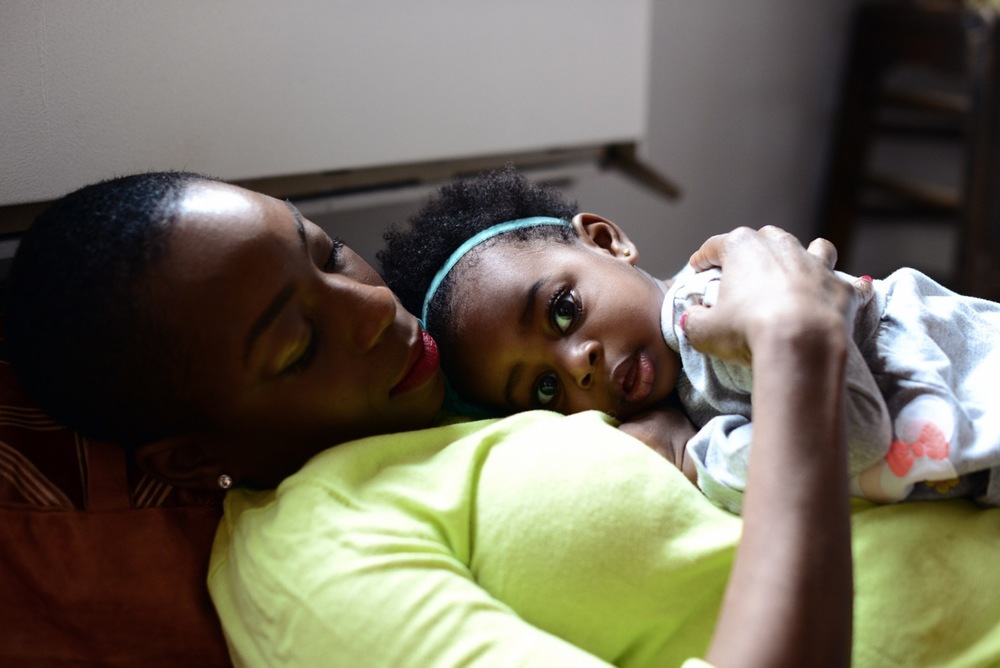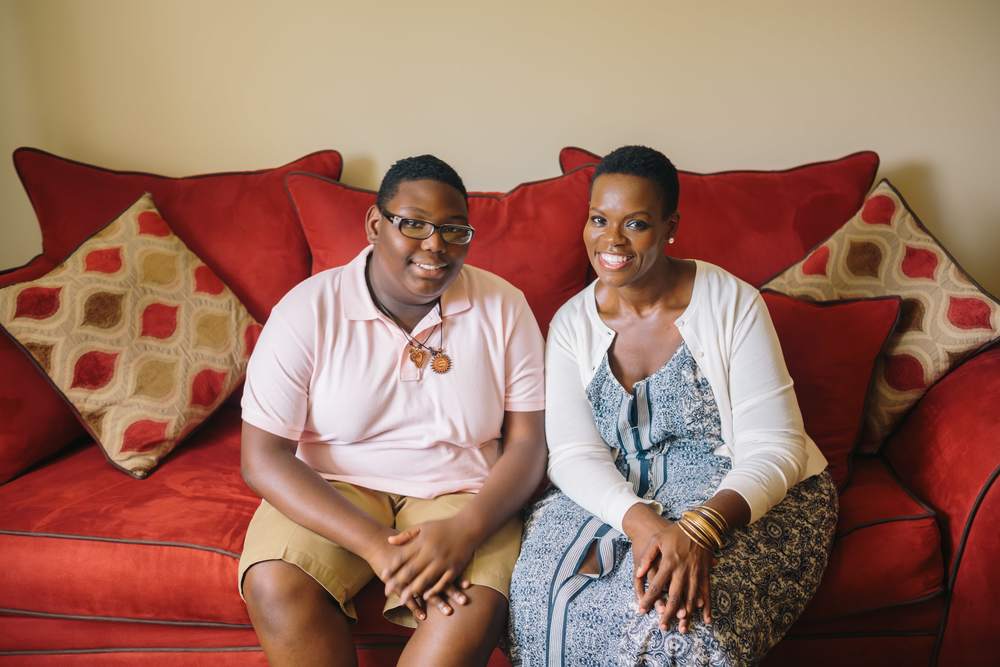Motherhood was instantaneous and unexpected for pastor and theologian Theresa S. Thames; when her sister passed away in November 2011 on Thames’ 32nd birthday, she decided to raise her nephew as her own. But while she was adjusting to her new life as “TT Mommie,” an affectionately given nickname to describe her new role, Thames was hit again and again with two more tragedies.
She tells mater mea how she found her way as a grieving and newly single working mom.
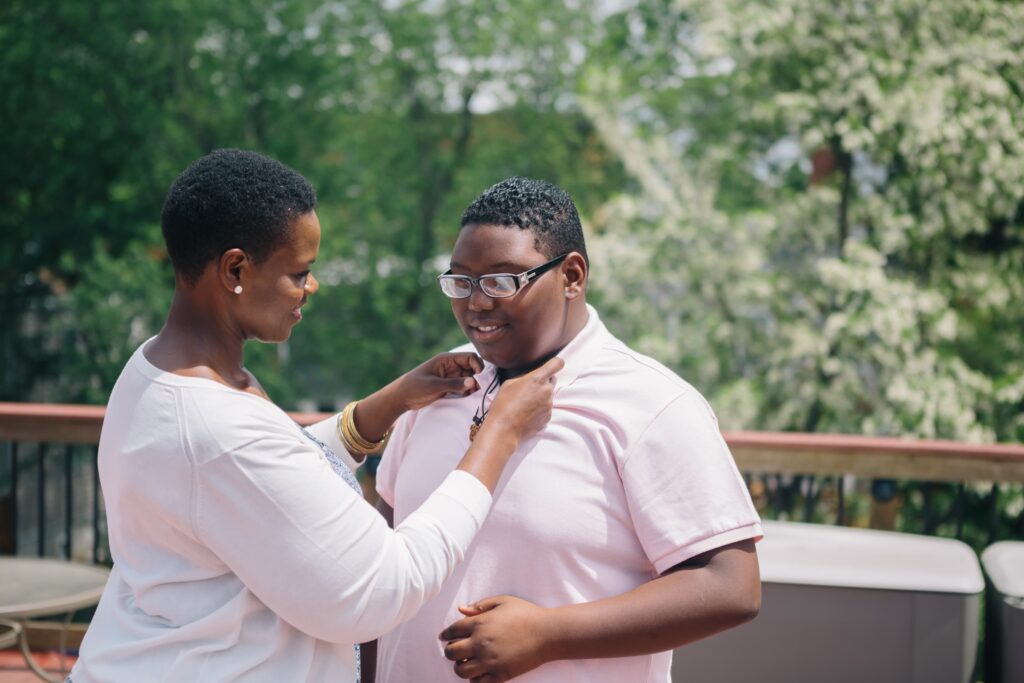
Pastor and theology scholar Theresa S. Thames, 35, isn’t your typical mother, and as such, doesn’t have a typical name.
Instead of momma, mommy, or mom, her 12-year-old son Delmost White calls her “TT Mommie,” a bittersweet name borne from a family tragedy.
“My sister [Portia] was eight years older than me when she died,” Theresa Thames explains. “He’s the only baby in my immediate family who was born after me. Growing up he called me ‘Pretty Auntie,’ because that’s what I told him my name was. So when my sister died of cryptococcal meningitis, it became [TT Mommie]. I am his TiTi, but I’m also his mom.”

Becoming the mother of a grief-stricken child and providing a better future for him is, in some ways, an extension of her life-long duty to serve her community—and an unconscious nod back to her own experience growing up in the South.
Life on the coast of Biloxi, Mississippi wasn’t always great for Theresa Thames as a young girl; she was raised by her grandmother and their church community because of her mother’s drug addiction.
“When my mom was too high to show up for things or when we didn’t have money for bills, my church and my community supported me,” Thames says now.
“The community raised me. The church gave me a place and affirmed my gift for public speaking [and] education [when I was] very young.” (Theresa Thames and her mother, who has now been clean for over 20 years, have since developed a mutually loving and supportive relationship.)

Those early affirmations may explain why Theresa Thames was always different from other kids. At 14, while other girls were nurturing obsessions with their looks, popularity, and boys, Thames was declaring her desire to become a pastor. It was an unheard of dream for that time and place, but one she wouldn’t let go of after feeling called to service.
However there weren’t many women pastors Thames could look up to, so she shifted gears and decided to study biology. She was accepted into Howard University in Washington, D.C. on a biochemistry scholarship, but quickly realized that she didn’t want to become a scientist, and switched her major to human communications studies.
Yet her teenage dreams of ministering were inescapable; despite not knowing what being a woman minister would look like, Thames went to Duke Divinity School after graduating from Howard to study religion with an emphasis in Hebrew and Old Testament Bible. She also discovered a woman-positive form of theology that she hadn’t experienced in her childhood church back in Mississippi.

Theresa Thames began to define what it meant to her to be a Black woman and a pastor: She co-developed the divinity school’s gender studies program, headed the women’s center, and served as a chaplain at Duke University Hospital for a year. She was developing her own brand of theology, one that’s centered on honesty and authenticity.
“Honest about my own story, about my own struggles… [I’m] just being very real with people because that’s what people want,” she explains.
“They don’t want a pie-in-the-sky theology; they want [something] tangible. In my ministry and in my life, it’s about me being transparent and authentic. Being transparent keeps me honest, it keeps me real, and it keeps me humble because, ‘There by the Grace of God go I.’”

She was also preparing to build a life with a man she met her sophomore year at Howard University. The two dated on and off during grad school, but eventually decided to stay together. In June 2007, Thames moved back to D.C. to make history as one of the first black women pastors at Foundry United Methodist Church. Two months later she and her husband were married, and focused on furthering their respective careers.
And in fact, over the course of her eight-year tenure at Foundry, her prodigious professional accomplishments soared. But, Theresa Thames says now, the dynamic her success created would ultimately lead to the undoing of her marriage.
“I was winning and successful, but we were failing and uncoupling,” Thames admits now.
In February 2011 they began the divorce process, and by May they were officially separated.

Three months later, she received the news of her sister’s untimely death and her orphaned nephew. Theresa Thames made the decision to bring Delmost from Mississippi to D.C. to live with her. (Delmost’s father was unable to take him in.)
“It was not a difficult decision for me to take him,” Thames says now, “but I had no idea how I would make life work as a single parent literally 1,000 miles away from my family. However, him remaining in Mississippi was not an option. I wanted him to have a full and healthy life, a life that would expose him to the world. I had no doubt that he would be loved and cared for in Mississippi by our family, but I also knew that their care of him would be limited.”

Though Theresa Thames doesn’t regret becoming TT Mommie, uprooting Delmost also meant making major changes in her life as well; she took six weeks of adoption leave from work to try and learn what life would look like for them as a new mom and son.

“Honestly, when he first came, I don’t know who cried more: me or him,” she says.
“He was sad and depressed; I was sad and overwhelmed. I was in the middle of a messy divorce and grieving, raising this child, and trying to do my job.”
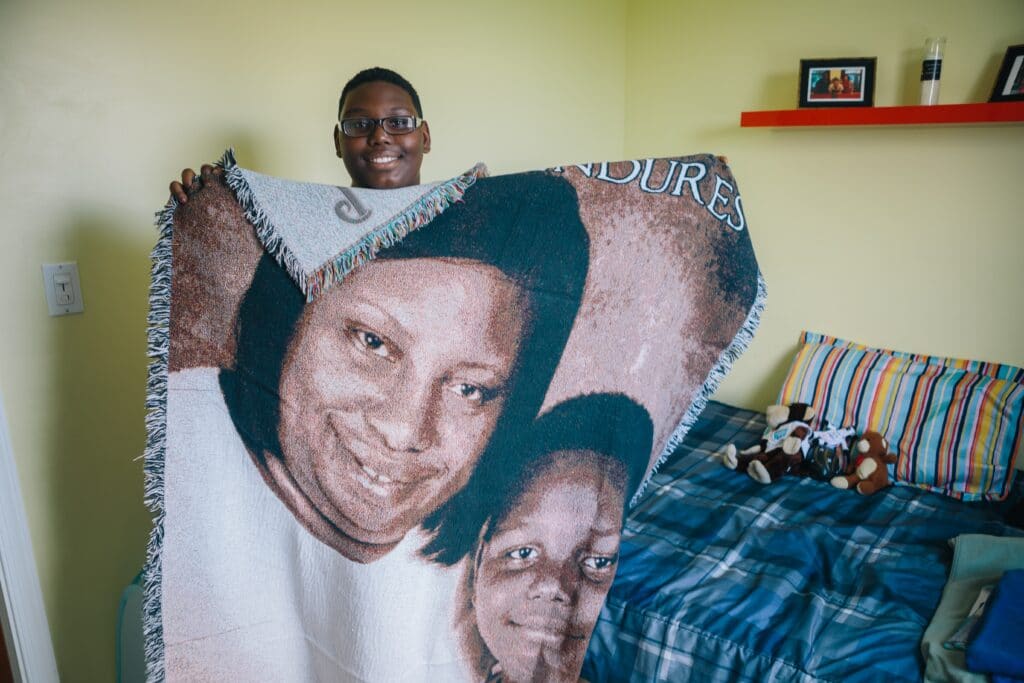

To keep sane, Theresa Thames leaned on her church and friends for support.
“I built the village and family that I needed,” she says now. “Those first few months were hard. There were a lot of tears from the both of us. He desperately missed being close to family, especially my mother, and I was overwhelmed with parenthood. I had to find a school, a pediatrician, and a barber. I had my first breakdown in the school uniform store because I had no idea how to buy pants for a boy.”
It was an incredibly emotional time for the new family, one that would only get harder: in April 2013, almost a year after their divorce was finalized, Thames got a phone call from her best friend while waiting at the pediatrician’s office. Her ex-husband was found dead. Ten months later, she learned of her father’s death.
“There was just this layer of grief and sadness,” she says. “Navigating that grief, in the midst of the everyday demands of life took a lot of time, yet no real journey is ever swift.”

Despite the great losses both Delmost and Theresa Thames have experienced, the pair have soldiered on together. They’ve found their groove as mother and son, and their days aren’t as teary as their first few months together were. Delmost has settled into his new home and Thames has continued on the path she set for herself when she was 14: in July she became the senior pastor at Cheverly United Methodist Church in Cheverly, Maryland and she’s in the midst of a doctorate program in leadership excellence at Wesley Theological Seminary.
“It now doesn’t feel as awkward,” Thames says of her role as a single, working mom. “This [past] July will be three years that he’s been with me. He’ll be 13 this year. This relationship is growing and flourishing, [and] yes, I’m TT Mommie.”
Q&A

HOW HAVE YOU GROWN IN THE LAST THREE YEARS OF BEING A PARENT?
[I] make room for a lot of mistakes. [I] don’t hold so tight to plans because plans change. [I] realize that this too shall pass: figuring out childcare, homework tantrums.
Someone told me this saying: “The days are long, but the years are short.”

WHAT WAS THE TRANSITION LIKE FOR BOTH YOU AND DELMOST?
He had to get used to a scheduled and structured life. This included attending meetings with me, having a bedtime, and the atrocity of not having a television in his room. Also, I do not cook Southern down-home food, so he had to get use to my “healthy” cooking.
I had to make many personal, professional, and financial sacrifices. I’m so thankful that I have colleagues that supported me as a single parent by babysitting, allowing my child to attend meetings, conferences, and being at the office after-school.
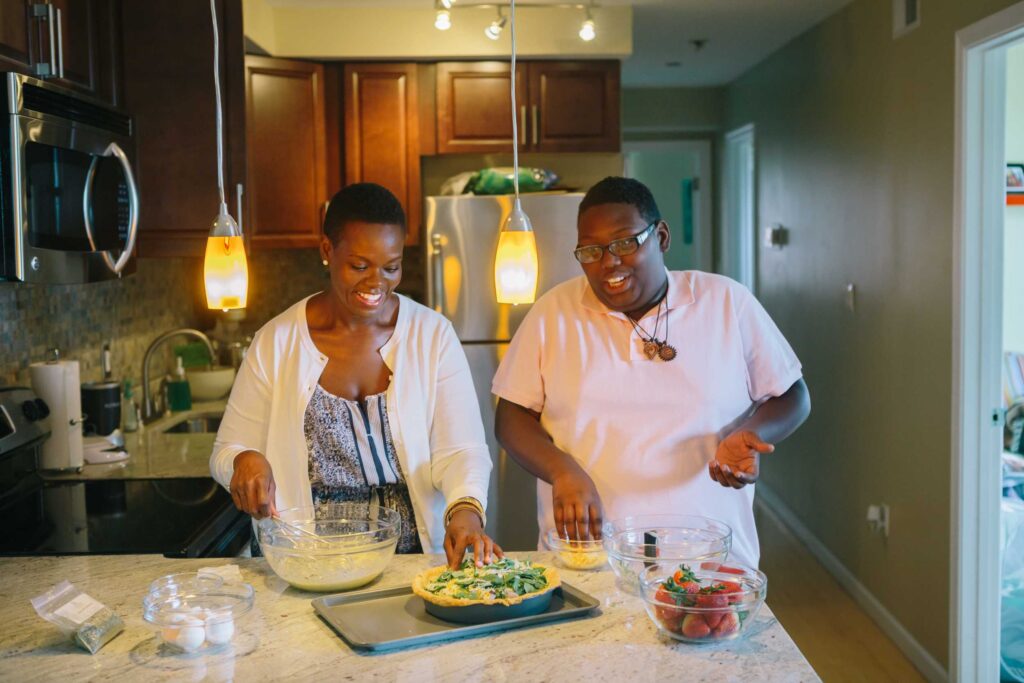
HOW WOULD YOU DESCRIBE DELMOST’S PERSONALITY?
Delmost is such a dynamic and mature young man. After the initial transition angsts, he completely opened his heart and mind to being here. I can take him to any function, event, fancy dinner and he knows how to act and charm the crowd.
When I have speaking engagements, he travels with me. He has experienced travel, culture, diversity, and community engagement in ways that have made him a compassionate and socially aware young man. He is now indeed a city kid, full of hope and great ambitions. I am so proud of him and thankful that he is in my life. I often say that I needed him as much as he needed me, maybe even more.
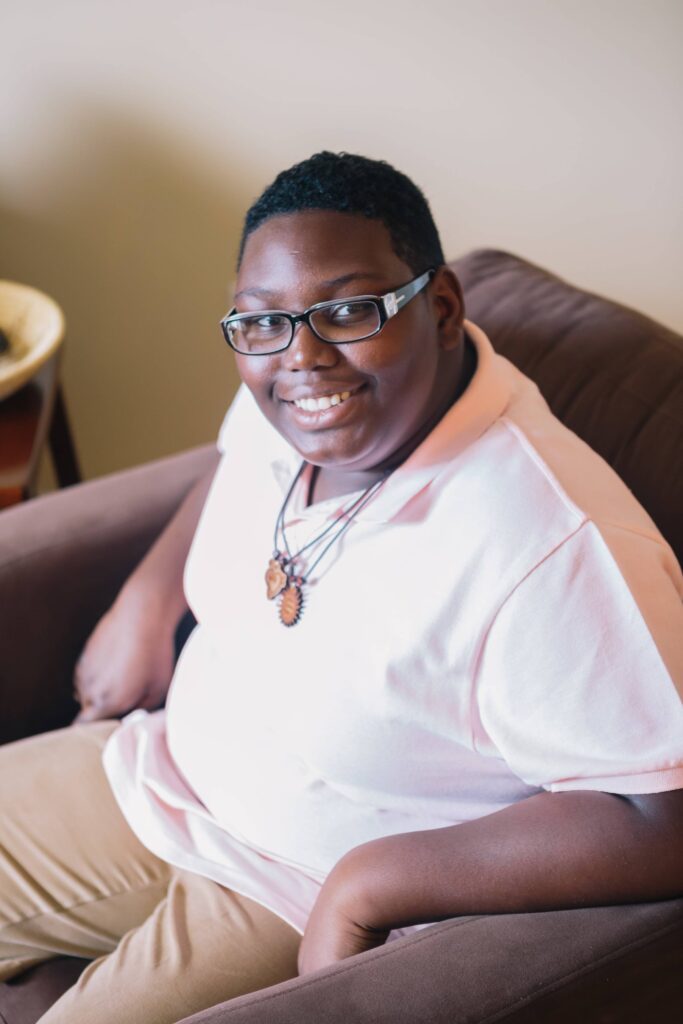
IN THE THREE YEARS THAT YOU’VE BEEN A MOM, HAVE YOU DEVELOPED A PARENTING PHILOSOPHY?
Yes! (Laughs)
My number one parenting philosophy is that it’s a growth process: he’s growing and I’m growing. My whole thing is to always remember that he is a person and that he is developing and learning. My philosophy is that it’s a continuous growth process, and to be kind to myself and to be kind to him.

I don’t play: I’m a disciplined parent, but I don’t spank, I don’t whip, I don’t scream. I don’t make threats; I make promises. He got in trouble at school and we were [supposed to go] on vacation to Jamaica. He just kept getting into trouble at school, so he didn’t go; I went by myself.
The other thing is he’s not the center of my life. I want him to know that he’s a huge part of my life, but he’s not my life. I have to take care of myself so that he can take care of himself. I want him to also have a rich life in that I’m not the center of his life, either.
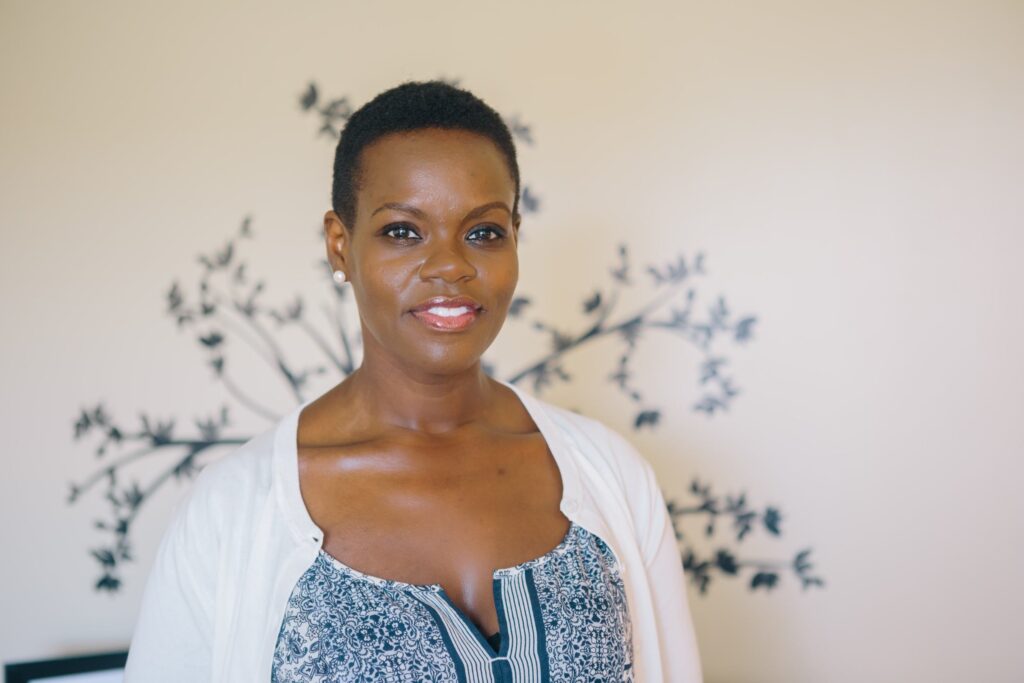
FILL IN THIS BLANK: I LOVE BEING A MOM THE MOST WHEN…?
When I see my child connect the dots for himself. You can teach a lesson, teach a lesson, teach a lesson, but then when you see or hear them doing it themselves, living it out themselves, and see that it has connected… That’s been the gift to me because I didn’t raise him; he was with someone else for nine years. So to incorporate him into a very, very different life than [what] he lived in Mississippi—to see him embracing and becoming his own self, but echoing some of the things he’s learned while he’s been here with me—that feels good. I love watching him become himself.
ON THE FLIP SIDE: BEING A MOM IS THE HARDEST WHEN…?
… [I’m] making the career sacrifices. I’m now [at] the age and place in my life and career trajectory where a lot is required of me. Do you make this decision for your career and how does that impact your child? All of those things just get hard.

WHAT ADVICE WOULD YOU GIVE TO SOMEONE THINKING ABOUT ADOPTION OR TO SOMEONE WHO’S RECENTLY ADOPTED, BUT FEELS LIKE THEY’RE IN OVER THEIR HEAD?
Build a community. Build a village. Your village doesn’t have to look like you. Your village doesn’t have to live in your neighborhood. Your village doesn’t have to be in your state. You tell the universe what you need and open your heart to it.
I am a headstrong Type-A woman so I can do it all, honey: make the bread, bake it, and [bring home] the bacon! Getting a kid, I knew nothing. It was important to me to realize that you don’t need to know how to do everything. Pride is a killer! You can’t operate in pride. You can’t operate in fear. It goes back to self-care: Say what you need.
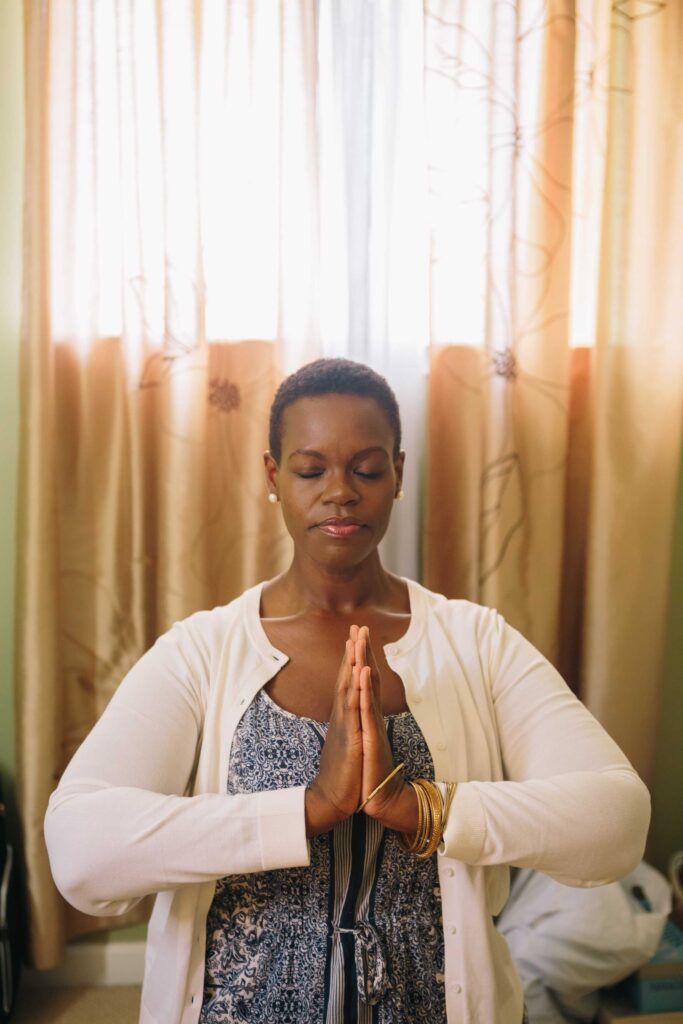
YOU’VE TALKED ABOUT THE IMPORTANCE OF SELF-CARE FOR KEEPING YOU SANE. WHAT IS YOUR VERSION OF SELF-CARE?
The three things that are most important to me are prayer, true friends, and self-care. Over the last year and a half, I’ve lost more than 200 pounds. I was just stuffing all of these emotions that I was feeling with food: Divorce is hard, marriage is hard, you pour yourself into your career, and then all of the grief that I was dealing with, too? One day, I just decided that I needed to be alive for [Delmost], but that I also needed to be alive for me. Every single day, I work out.
[Self-care is about] being kind to myself, giving myself time out, and asking for what I need, which is hard. I had to take off the Super Woman cape that I thought I needed to wear to show that I was competent. So self-care for me is making time for rest, making time for fitness, making time for prayer, and talking to my therapist. The most important one is asking for what I need—whether that’s a pay raise, a favor, [or] asking someone to get out of your life.

WHAT PERSPECTIVE DO YOU HOPE TO IMPART ON YOUR SON THROUGH YOUR WORK? WHAT DO YOU WANT HIM TO TAKE AWAY FROM YOUR CAREER?
[The] biggest thing that I want him to take away is that integrity matters and relationships matter. What I mean by that is my church is open and affirming: it’s multiracial, multicultural, and [has] people of different socioeconomic [backgrounds]—every single person matters regardless of race or sexual orientation, from the richest person to the person who has nothing. Each and every person matters. Integrity matters, and I want him to be a man of integrity.
It’s so easy for pastors to be glorified in churches, [but] then they’re horrible people in private. I never want him to be able to say that I was this horrible person behind closed doors. Who I am in my public life is who I am in my private life; that’s the type of integrity that matters to me, that I want to model for him.

WHAT’S THE MOST GRATIFYING PART OF YOUR JOB?
I think the most gratifying and the most “holy shit” moments of my job is that God’s calling me to do this! I think, Are you for real? Am I being punked?
In the holiest of moments—when I’m standing there officiating a wedding or holding someone’s baby or praying with someone as they take their final breaths or placing ashes on someone’s forehead—as beautifully human and flawed as I am, God still uses me.

I grew up in the projects, my mom was once on drugs, I was raised by my grandmother. I’ve made mistakes and I’ve failed a few times… I’ve made it because God has used me in this way. God keeps using me and I want to do what I need to do to do that. God does God’s part and I have to show up and do Theresa’s part.


